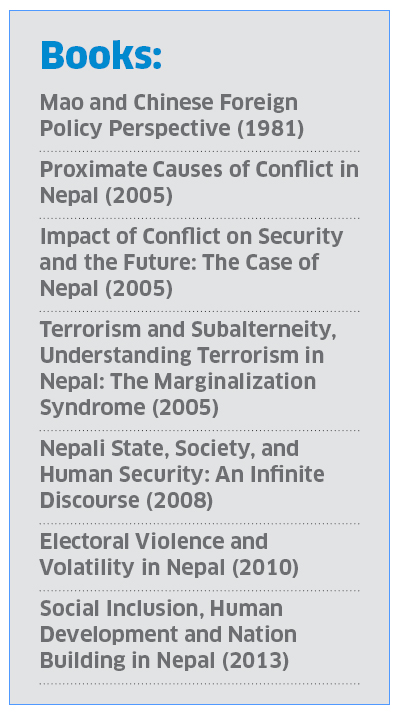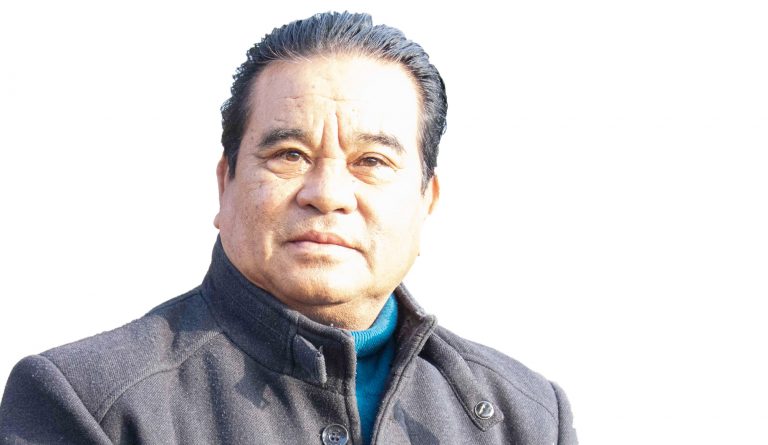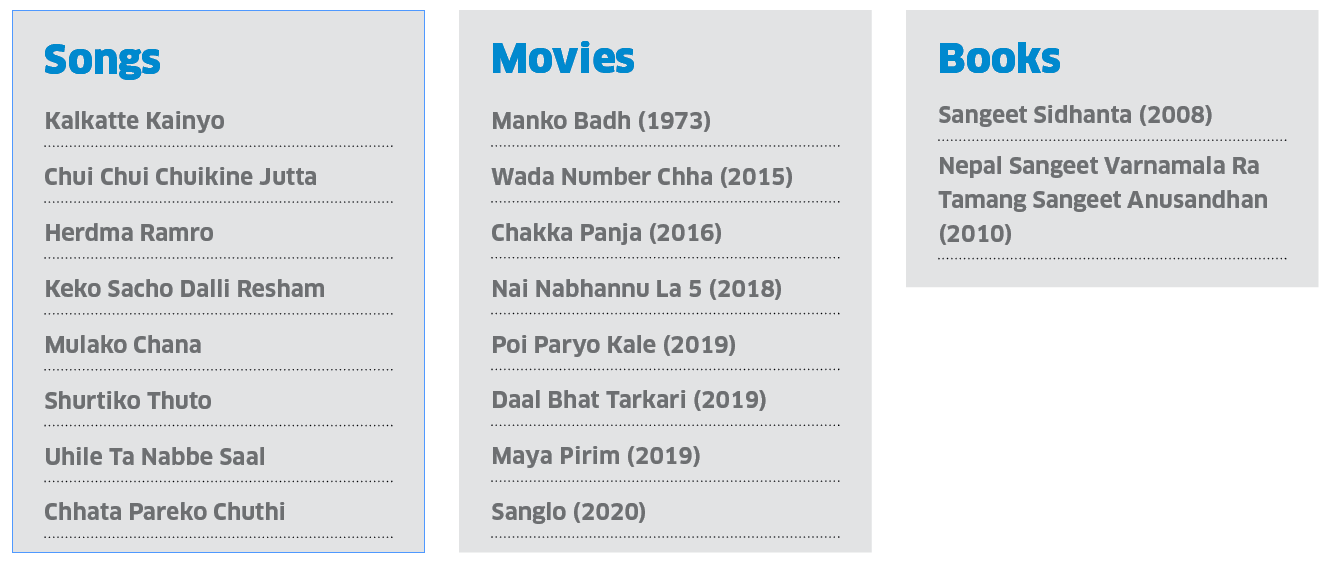Dhruba Kumar obituary: A towering scholar
Birth: 1949, Kathmandu
Death: 16 March 2022, Kathmandu
At a time when most Nepali professors, intellectuals and civil society leaders like to attach themselves to political parties to curry favors, Prof. Dhruba Kumar, who died aged 73 on March 16, was a rare exception.
He was an inspiration for the advocates of democracy and human rights. Prof Kumar was among the few intellectuals in the country with vast knowledge in foreign, defense, geopolitical and strategic affairs. Crucially, he possessed the rare knack of explaining these complex topics to the public with clarity and simplicity.
All his life, Prof. Kumar was an ardent champion of equality and social justice. He was against all kinds of discrimination and never used his surname in his journals, books and columns.
Despite being a profoundly learned man, he never had an air of self-importance.
A retired professor of Political Science at the Center for Nepal and Asian Studies (CNAS), Tribhuvan University, he was a passionate researcher on the politics of South Asian countries.
More recently, Prof. Kumar’s columns focused on relations between Nepal, India and China, where he discussed India’s ‘hegemonic tendency’ and China’s ‘silent tactics’.
Prof Kumar began as a China scholar at CNAS and gradually expanded his study and research in other South Asian countries, becoming one of the authorities on the region’s strategy, diplomacy, security and geopolitics.

His fellow professors at CNAS remember Prof. Kumar as an inspiration for all scholars.
“He was the one to start the culture of academic research on security affairs,” says Krishna Khanal, who had worked with Prof. Kumar at CNAS. “He was also a pioneer in the study of Chinese politics.”
In his academic career, Prof. Kumar wrote many books on foreign affairs, conflict and security. He also participated in fellowship professor exchange programs in universities around the world. He was a FCO Fellow at the Department of War Studies in King’s College London, England; Ford Visiting Scholar at the Program in Arms Control, Disarmament and International Security in University of Illinois, Urbana Champaign, Illinois, USA; and Visiting Fellow at the Faculty of Asian and International Studies in Griffith University, Brisbane, Australia.
Prof Kumar worked as a full-time professor at the School of International Development and Cooperation (IDEC) in Hiroshima University, Japan. In 2002, he was a member of the SEAS 2002 Conference that was jointly sponsored by the US Commander-in-Chief Pacific (USCINCPAC) and the Department of State for Security Professionals of the Asia/Pacific Region.
He is survived by his wife and three daughters.
Hasta Bahadur Thapa obituary: The man who added musicality to Nepal Police
Birth: 1930
Death: 6 March 2022
Hasta Bahadur Thapa, who played an important role in the establishment of Nepal Police Band, passed away on 6 March at the age of 92.
Thapa was born in a small village in Syangja district. He entered the British Army in 1949 and was the band instructor to the British Gurkha Band. In 1972, he was the assistant music director in the British Gurkha Army when Khadgajeet Baral, the then Inspector General of Nepal Police (IGP), brought him to Kathmandu to train the Nepal Police Band.
Thapa played a crucial role to train and develop the Nepal Police Band. It was under his leadership that the band started the annual Beating Retreat ceremony in 1973. Thapa had also led the band to Scotland to perform at the Annual Royal Edinburgh Military Tattoo.
Thapa had served in the British Army for 28 years before joining Nepal Police. He was appointed a police inspector in 1977 at the order of the then King Birendra. He went on to serve in the police force for almost two decades before retiring as a superintendent in 1997. During his time in the force, Thapa also helped in the development of the National Police Academy School of Music.
Thapa is remembered for his contribution to modernizing the police band with the changing times, according to Senior Superintendent of Police Bishnu Kumar KC, who is also a Nepal Police spokesperson.
After retiring from the Nepal Police, Thapa was hired by the Armed Police Force (APF) to train its band. He worked as a musical instructor of the APF Band for seven years.
After working as a bandmaster and music instructor for the British Army, Nepal Police and the APF in a career spanning nearly six decades, Thapa dedicated his retired life to writing. He has written five books.
His most notable work is his autobiography ‘Mero Jiwanyatra’, where he has written about his musical journey in the security forces. In the book, he recollects his contributions to the three agencies, and about his experience traveling the world.
He passed away on the morning of 6 March from pneumonia-related complications.
Books:
*Mero Jiwanyatra (2019)
*Prathamik Sursamata Marga - part 1, 2, and 3 (2017)
*Aadharbhut Staff Notation Tatha Nepali Parva, Sanskar Ra Sanskritik Dhunharu (2017)
*Saral Sangeet Jhanmala
*Prampragat Bigul Dhun
Biru Lama obituary: The ‘driver’ of the 1973 plane hijack
Biru Lama, who participated in the 1973 hijack of an airliner in Biratnagar as part of rebellion against the partyless Panchayat regime, died on March 3.
A lifelong Nepali Congress supporter and a close confidant of late Nepali Congress leader and Prime Minister Girija Prasad Koirala, Lama, despite being a key actor in one of the most pivotal moments in Nepal’s political history, was never given the credit he deserved.
Those who knew Lama closely, including former minister JP Gupta, describe him as an unsung democratic hero.
Born in Nepalgunj, Banke, Lama moved to Biratnagar, Morang, with his sister and her husband in his early teens soon got involved with the Congress. He was exiled in India at a young age after being implicated in a bombing in Rani, Biratnagar. His political schooling started in India, too, where he lived with underground Congress politicians and cadres.
On 1 June 1973, a 19-seater Twin Otter passenger aircraft, bound for Kathmandu from Biratnagar, was hijacked and taken to Farbisganj, India. The hijackers were NC activists Durga Prasad Subedi, Basanta Bhattarai and Nagendra Dhungel. The whole incident was orchestrated by Girija Prasad Koirala. The other accomplices were Sushil Koirala, also a former NC president and prime minister, Binod Aryal, Manahari Baral, Rajendra Dahal and Biru Lama.
The aircraft, which was transporting the Nepal Rastra Bank’s Rs 3 million, was forced to land on a grass field in Forbesganj of Bihar, India. The goal was to steal the money to fund the armed revolution against the Panchayat regime.
As the plane landed in Forbesganj, a car was waiting there to collect the money. Lama was the driver. It was his job to transport the looted money as well as the Congress leaders, from Bihar and all the way to West Bengal. There, late NC president and Prime Minister BP Koirala and other party leaders were in hiding.
The incident has been well documented in Subedi’s book ‘Biman Bidroha’.
Lama, who was arrested and jailed in India after the incident, returned to Nepal alone with other exiled NC leaders in 1979-80. He remained close to the Koirala family and worked as a driver for Girija Prasad.
Gupta, in a tribute piece to his old friend, wrote that Lama never resented being identified by others as the driver of Girija Prasad. He remembered Lama as ever so humble and a man of few words.
Lama is survived by his wife Sushma Sharma and two children. He was previously married to Armina Gurung.
Jayananda Lama obituary: A multi-talented artist
Birth: 27 July 1955, Sindhupalchok
Death: 23 February 2022, Bhaktapur
Jayananda Lama, who died aged 66 on February 23, was a man who wore many artistic hats: he was a singer, dancer, music scholar, movie producer, director and actor.
The voice behind ‘Kalkatte Kainyo’, a popular Nepali folk song, and ‘Keko Sacho Dalli Resham’, a ditty popularized among modern music listeners by blues-rock group Mukti and Revival, Lama initially started out as a dancer before making his name in music and acting.
Lama was a 12-year-old boy growing up in Sindhupalchok when he was discovered by Bhairav Bahadur Thapa, a veteran choreographer and dance scholar who was scouting for musicians and dancers from across the country.
The young Lama came to Kathmandu where he was schooled and trained under Thapa’s tutelage. He became a member of Bhairav Nritya Dal, the country’s first cultural troupe established by Thapa and playwright Balkrishna Sama. Lama’s contemporaries at Bhairav Nritya Dal included actor Hari Bansha Acharya and singer and musician Ram Thapa. The eclectic circle of friends, each talented in a different field of performance art, had a great influence on Lama. He also learned to sing and play musical instruments.
As a little boy, Lama participated in a national cultural competition organized to mark the 46th birthday of the then king Mahendra. His performance won him a consolation prize of Rs 1,000 and a deal to record four songs at Radio Nepal. His first song ‘Roko Manalai Bujhaune Ko Hola?’ was recorded in 1967.
The competition was a turning point in Lama’s life. His performance had impressed the king and other royal family members. After the show, King Mahendra and the crown prince at the time, Birendra, praised Lama and offered to pay for his studies. He would get to know the royal family more intimately in the future.
Lama continued his schooling and training at the Bhairav Nritya Dal. With his fellow dancers, singers and musicians, he toured different parts of the country and abroad for shows.
Lama had a BA degree in Music from Lalitkala Campus, Bhotahiti. After getting the degree, he got a job at Nepal Academy (Royal Nepal Academy at the time). He also became a music teacher for the then crown prince Dipendra.
While at the academy, Lama got his master's degree in Music from Allahabad, India. Not long after his return from India, he joined Radio Nepal with the intent of promoting Nepali folk songs and artists. At the Radio Nepal studio, Lama recorded his own numbers and promoted other folk musicians like Narayan Rayamajhi.
Artists who worked with Lama remember his collaborative spirit, humility and contribution to promoting and popularizing folk songs. He recorded more than 200 songs during his lifetime. His song catalog was instrumental in the launch of Music Nepal, the country’s first music company.

Lama also worked as a lecturer of music at Tribhuvan University for four years and traveled across Nepal researching and collecting local folk music. His research led him to write two related books. At the time of his death he was working on his third book, on Pingul script, the oldest Nepali folk music script.
A man of many talents, Lama was also an actor—a prolific one. Since his debut movie ‘Manko Badh’ (1973) he went on to appear in over 100 films and TV shows. Although he dabbled in producing and directing films and TV series, he was best known for his acting.
He was mostly cast in comic roles, which he portrayed deftly. The smash hits ‘Chakka Panja’ (2016), ‘Nai Nabhannu La 5’ (2018), and ‘Poi Paryo Kaley’ (2019) are among his popular films.
Lama had been making more TV and film appearances in recent years.
Although he participated in musical events and TV shows like ‘Nepal Lok Star’, a singing reality contest for folk singers, he had not recorded his own songs in decades. In several interviews, Lama had expressed his discontent with the current folk music scene. He had come to despise the brazen vulgarity seeping into modern folk songs in the name of producing commercial hits and he didn’t want to sing anymore.
He was all about preserving and promoting folk roots and traditions.
Lama did make a comeback from his long musical hiatus by releasing a song a couple of months ago before his death. In one interview he had even said that he had collected enough songs to keep crooning for the rest of his life.
Lama is survived by his wife and two sons.





















